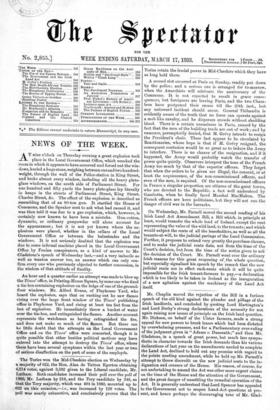A second riot occurred at Paris on Sunday,.rea,dily put down
by the police; and a serious one is arranged for to-morrow, when the Anarchists will celebrate the anniversary of the Commune. It is not expected to result in grave conse- quences, but foreigners are leaving Paris, and the two Cham- bers have postponed their recess till the 20th inst., lest any untoward incident should occur. General Thiband in is evidently aware of the truth that no force can operate against a mob like cavalry, and he disperses crowds without shedding. blood. There is a certain uneasiness in Paris, caused by the fact that the men of the building trade are out of work; and by rumours, peremptorily denied, that M. Grevy intends to resign the President's chair. These last appear to be circulated by Reactionaries, whose hope is that if M. Grevy resigned, the consequent confusion would be so great as to induce the Army to interfere. There is no chance of the resignation, and if it happened, the Army would probably watch the transfer of power quite quietly. Observers interpret the tone of the French Army too much by that of the superior officers. They forget that when the orders to be given are illegal, the consent, or at least the acquiescence, of the non-commissioned officers, and even of the men, is required. Of the non-commissioned Officers in France a singular proportion are citizens of the great towns, who are devoted to the Republic, a fact well understood by Gambetta, when he finally faced Marshal MacMahon. The French officers are keen politicians, but they will not run the danger of civil war in the barracks.


































